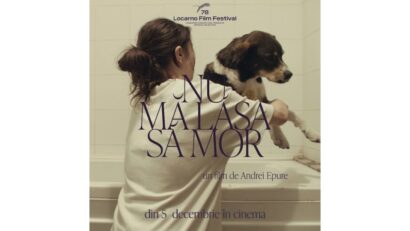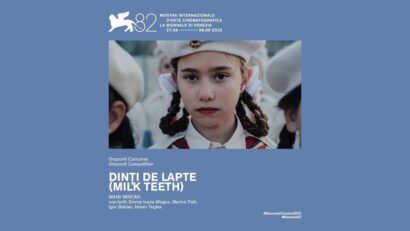Emilia Dobrin, recipient of Lifetime Achievement Award
An actress with an impressive career in cinema, but also on stage.

Corina Sabău, 01.11.2025, 14:00
After being honored with the Lifetime Achievement Award at the 24th edition of the Transylvania International Film Festival, actress Emilia Dobrin also received an excellence award at the Romanian Film Evenings (SFR) Festival in Iași, an edition dedicated to women who give voice, color and courage to cinema, theater and music.
Emilia Dobrin’s first appearances in cinema took place while she was still in college, with roles in Sick Animals (dir. Nicolae Breban, 1970) and the classic comedy Tonight We Dance in the Family (dir. Geo Saizescu, 1971). During the same period, she became friends with director Alexandru Tatos, with whom she began a long-term collaboration, resulting in several of his most acclaimed films, such as Red Apples (1975), Wandering (1978), Sequences (1982) and The Secret of the Secret Weapon (1988). After 1990, Emilia Dobrin continued to explore diverse roles in cinema, being part of the cast of films such as Fury (dir. Radu Muntean, 2002), Japanese Dog (dir. Tudor Cristian Jurgiu, 2013), The Anniversary (dir. Dan Chișu, 2017) and recently returned to the big screen in the multi-award-winning film The New Year That Never Came (dir. Bogdan Mureșanu) and the experimental docu-fiction Maia – Potrait with hands (dir. Alexandra Gulea).
The New Year That Never Came, a tragicomedy directed by Bogdan Mureșanu, follows the destinies of six characters who meet around the time of the fall of communism, characters who search for normality and meaning in a world marked by fear and absurdity. In this film, actress Emilia Dobrin plays Margareta Dincă, whose house, located in the Uranus neighborhood, is about to be demolished to build a new block of flats. It is actually one of the last houses left undemolished and Margareta has the misfortune of having to leave her home shortly before the Revolution. Emilia Dobrin spoke to RRI about the challenges this role brought her and about her encounters with the audience. Track: “For me it was an extraordinary thing. I’ve said it before and I’ll say it again, it was like an exorcism exercise. That was the experience I had during the filming. And it was wonderful that the film had humor, even though it’s a film with a tragic story. We’re talking about times that I couldn’t completely escape, not even as a memory, there were events that made me realize that I hadn’t completely overcome my fear and horror of those times. Out of the entire cast, I’m the only one who lived through the entire period of communism. It was very difficult, I also caught the Gheorghe Gheorghiu-Dej period, so that harsh communism hit me right from the beginning.”
The film caravan dedicated to promoting the film The New Year That Never Came written, directed and produced by Bogdan Mureșanu passed through several cities in Romania. Emilia Dobrin tells us how it was at the meetings with the public. Track: “You realize that I never thought that I would get to experience this fulfillment, this joy. I starred in films that were difficult during the communist period, which could only run for two or three days and then did not have the chance to be shown to the public during that period. Two of these were “Sequences” and “The Secret of the Secret Weapon”. And now, this possibility of meeting people, talking to them and having them so close was wonderful. But what moved me the most were the meetings with young people. And the reaction of my grandchildren mattered a lot to me. They told me that after the film was shown they felt very scared by the prospect of those times, it was very hard for them to believe that we had gone through something like that. They almost couldn’t believe that what they saw in the film had happened in reality, that houses had been demolished, that a child could enjoy a wooden pencil case or an orange. However, there was a question at one of the meetings with the students that I can’t forget. A girl stood up and asked me if I thought that Romanians had somehow genetically imprinted this obedience in the face of totalitarianism. And naturally the answer was no, absolutely not. But it was a very pertinent question but at the same time very painful.”
In parallel with her impressive activity in the world of film, Emilia Dobrin has also demonstrated her acting versatility in dozens of memorable theatre plays, staged by directors such as Alexandru Tocilescu, Claudiu Goga, Radu Afrim or Eugen Jebeleanu. For the role of Elena in the show The Cathouse directed by Radu Iacoban, she received the UNITER award for best actress in a lead role in 2016. (EE)






























